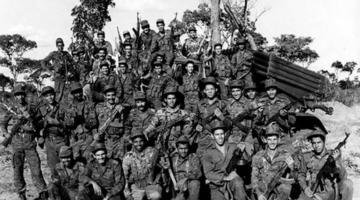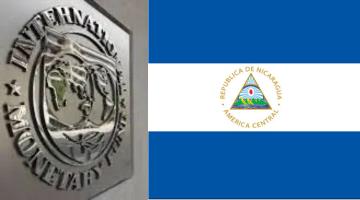The U.S. and the West as a whole maintain dominance over the Global South through their control of international institutions they wield as a weapon against nations who attempt to move from under their thumb.
As we watch the zionist government destroy any semblance of international law by committing multiple war crimes a day in Palestine and wonder, “How is this possible?” we must look at international governance as a whole and ask if it ever really worked in the first place. And we must admit that the institutions established for global governance are structurally constructed and used to consolidate and maintain U.S. global political and economic hegemony. A look at the UN and its various political entities, as well as global financial institutions such as the International Monetary Fund (IMF) and the World Bank (WB), reveals this reality.
On December 29, 2023, South Africa filed a case of genocide against Israel under the Convention on the Prevention and Punishment of the Crime of Genocide as a result of their indiscriminate assault on Gaza. It filed this charge through the International Court of Justice (ICJ), the judicial branch of the United Nations meant to hold nations accountable to international accords and conventions they agreed to uphold.
However, the United Nations has long been criticized and its legitimacy questioned. In the United Nations, the power imbalances that are obvious, such as the Security Council which gives a select five countries (United States, United Kingdom, France, China, and Russia) permanent veto power. Over the years, the organization’s clear bias towards U.S. foreign policy has been revealed. With its veto power, the United States shares executive power over international policy in the UN Security Council. It has, over the course of the seven months of the zionist genocide of Palestinian people, used this power to veto three “ceasefire” resolutions and one resolution for giving Palestine full membership in the UN. From 1945, out of the 36 draft resolutions presented to the Security Council about Israel/Palestine, the U.S. vetoed 34 of them. Now, the U.S. has dismissed as “meritless” South Africa’s case against Israel at the ICJ, demonstrating how far it will go to use (or abuse) global institutions to protect itself and its allies.
This is, by no means, the first time the US has flexed its control over the UN and its agencies. The U.S. has used its veto power in the UN before to avoid accountability mandated by the ICJ, for example in the case of Nicaragua against the U.S. In 1986 the U.S. displayed this power when Nicaragua brought the country to the ICJ for illegal intervention in arming the opposition forces known as the Contras. The ICJ ruled that the U.S. had violated international law by funding the Contras and supporting the creation of a rebellion against the legitimate Sandinista government. When a resolution was proposed to the General Assembly urging adherence to the ruling and seeking to hold the U.S. accountable, the U.S. cast the sole veto, resulting in an 11-1 outcome and effectively terminating the resolution.
In fact, the U.S. has an extensive track record of being the sole ‘no’ vote and using its veto power to prevent the implementation of resolutions agreed on by the overwhelming majority of the world. In a direct quote from the U.S. State Department:
In 2018, the United States voted against 70 percent of UN General Assembly resolutions requiring a vote, more than any other UN member state. The average UN member state voted against 6 percent of resolutions. The United States also voted against the most resolutions in 2016 (58 percent) and 2017 (71 percent).
We can see how this unjust pattern has had a larger impact on preventing international peace in the 2018 UN report to Congress, where it was reported that the U.S. voted in isolation against resolutions regarding conflicts in the Republic of Congo, Ukraine, Hungary, and Dominican Republic.
However there are other, more discrete, forms of this power imbalance. For example there are several countries that the United States directly financially supports, and that support is contingent on aligning with U.S. foreign policy. Israel, Micronesia, Marshall Islands, Fiji, Hungry, and Poland among others all consistently vote on the side of the U.S. while each receives millions (for some countries billions) a year in development and military aid. This means more than voting alongside the US in the general assembly. For example, if any of those countries have judges in the ICJ, then those judges will also vote in favor of US policies.
The case South Africa has presented in the ICJ represents resistance against decades long U.S. impunity and dominance over international affairs. The U.S. and Israel choosing to continue the assault on Gaza in the face of overwhelming global opposition makes denial of the global power imbalance impossible.
If this type of clear abuse of unjust power can put the legitimacy of the UN and ICJ in question, then we must also question the validity of other global institutions, especially the IMF and World Bank. US global political dominance is linked to its global economic dominance. This dominance emerged towards the end of World War II with the founding of the Bretton Woods, the International Monetary Fund (IMF), and the World Bank, which established the dollar as the global currency and, with that, placed the US in charge of the “institutional architecture” of a global economy that reflected US power and dominance.
The IMF is a corrupt institution whose function is to “provide financial assistance and work with governments to ensure responsible spending”. To do this, the IMF provides large-scale loans and ‘assists’ governments in determining how to spend these funds. This ‘assistance’ is called IMF Conditionality. This conditionality means that in order to attain the loan, countries have to agree to abide by the economic policies of the IMF and eliminate any policies they don't approve of. This is an important contingency because, like the World Bank, the IMF also inherits the economic framework of its majority shareholder, the United States, which also holds sole veto power. Through this form of insidious imperialism, the U.S. can ensure that all 94 countries that currently have a loan from the IMF have to abide by Free Trade policies, making them economically favorable to imperial nations.
The IMF has also been used as an external tool by the U.S. to fund and legitimize foreign governments that they had a direct part in putting in power. The 1991/2004 coup in Haiti is a perfect example of this dynamic. After the first CIA-sponsored coup d’état of then-president Jean-Bertrand Aristide in 1991, the U.S. put immense pressure on the Aristide government to enforce a ‘structural adjustment plan’ from the IMF. This ‘plan’ was a contingency of U.S. support of Aristide’s return to Haiti in 1994, who disagreed with the privatization approach to the economic plan. Aristide’s incomplete acceptance of this neoliberal privatization plan, a position shared by the majority of Haitians, led to the IMF and World Bank pulling away from Haiti until a full development assistance embargo was put in place. This bankrupted the country and set the stage for the 2004 U.S.(France and Canada - )-backed coup. After the installment of the unelected Gerard Latortue government, which was put in place by a US/UN-appointed international council, the World Bank infused $75 million into the unelected government which abided by the IMF’s conditionalities of the ‘structural adjustment plan’ and privatization of the country.
The infrastructure of global imperialism also includes the World Bank. Like the IMF, the power dynamic within the World Bank lies disproportionately in the hands of the United States, which holds a majority share and the only veto in that institution.The function of the World Bank is to “ …work in every major area of development. We provide a wide array of financial products and technical assistance, and we help countries share and apply innovative knowledge and solutions to the challenges they face.” The World Bank works in 11 different sectors from economic policy, environmental and resource management, to urban and rural development, creating projects to combat issues in these sectors. What this looks like in action is the World Bank giving small low interest loans to projects that align with their approach to economic development. The approach of the World Bank reflects that of their majority shareholder, and all projects have to survive a veto from the United States as well.
Because of this structure, the World Bank has maintained a strong Free Trade policy that aligns with the U.S.’s policy of trade liberalization. The U.S. has used the World Bank to forcefully export these policies, as seen in Chile in 1973. After the U.S. backed coup of democratically elected president Salvador Allende, who did not receive a single World Bank loan, the World Bank injected $60 million by 1977 into the Pinochet dictatorship under strict conditionalities by the IMF. The U.S. has used the World Bank as a tool to fund and legitimize foreign governments that they put in power, and undermine those that don’t align with them. This pattern of using the IMF to legitimize and fund unelected governments can be applied to countries across the globe.
Today, while the U.S. sends $3 Billion a year to uphold military apartheid in Palestine, they also approved $35 million, via the World Bank, to Palestine in relief aid to address the violence they are simultaneously causing. In the case of Palestine, every project approved by the World Bank has been an empty promise as the main shareholder of these institutions is the same country funding their oppression and current genocide.
It is clear that the same countries that were “underdeveloped” in 1944, at the time the International Monetary Fund (IMF) and World Bank were founded, are still underdeveloped today. These countries were mostly colonies of Europe during the Bretton Woods meetings. Western imperialists blame economic disenfranchisement in these countries (of the Global South) on local conflict, corrupt politicians, and a racist fundamental belief that the Global South is incapable of self governance. Yet, history will demonstrate that Global South countries have not been able to positively use these global institutions to protect their autonomy and sovereignty. The development goals of these countries do not align with the imperialist framework and U.S. control of the UN, IMF, and World Bank. Despite the limitation of these institutions, South Africa’s case of genocide against Israel does hold substantial significance. U.S. resistance to global solidarity for Palestine proves that it is consistently a barrier for international peace. The World Bank, International Monetary Fund, and the United Nations are prime examples of how, through these systems of neo-imperialism, the United States is able to direct the economy and development of countries throughout the globe, and in the process upholds its hegemony.
From Haiti to Nicaragua, U.S. dominance over international governance comes at the expense of the autonomy of the Global South and must come to an end.
FREE PALESTINE! FREE HAITI!
Krys Cerisier is a Haitian Panamanian organizer and journalist from the Bronx, New York. Cerisier works in US foreign policy in Latin America and the Caribbean, LGBTQIA+ rights, and Black and Indigenous movement building.

















